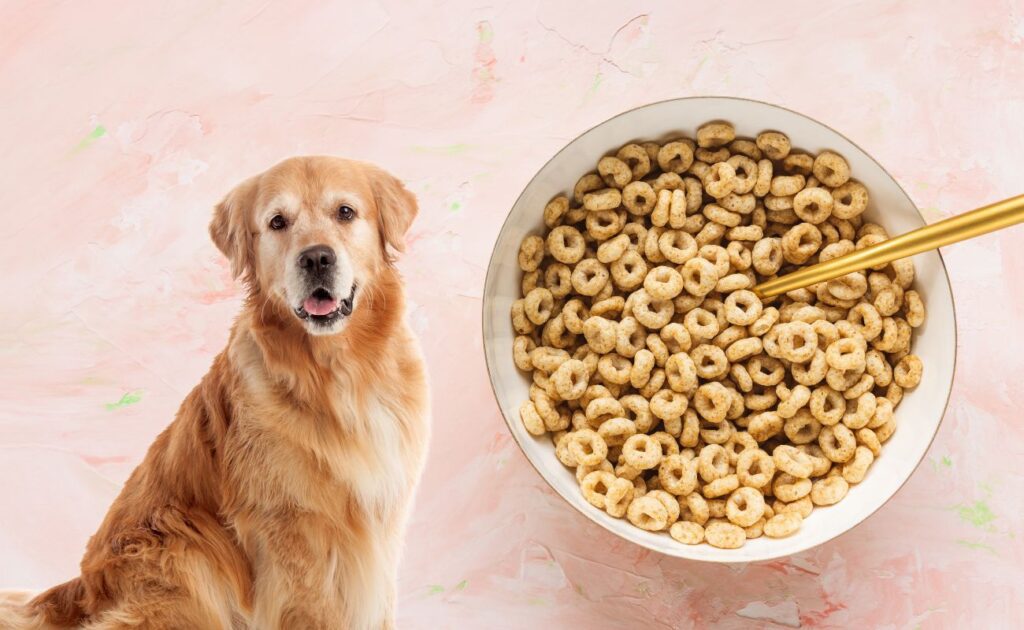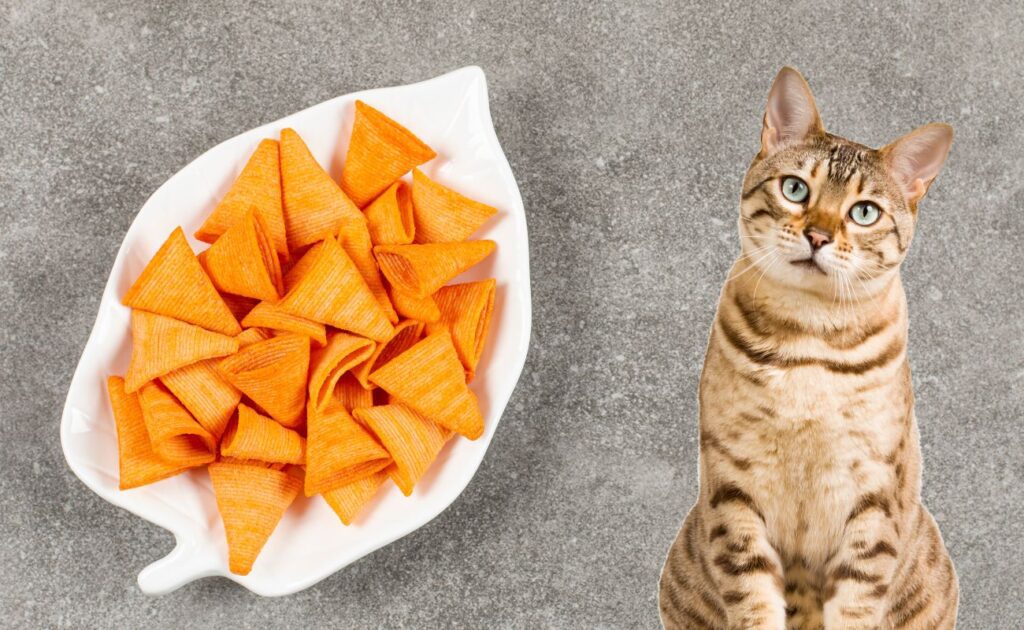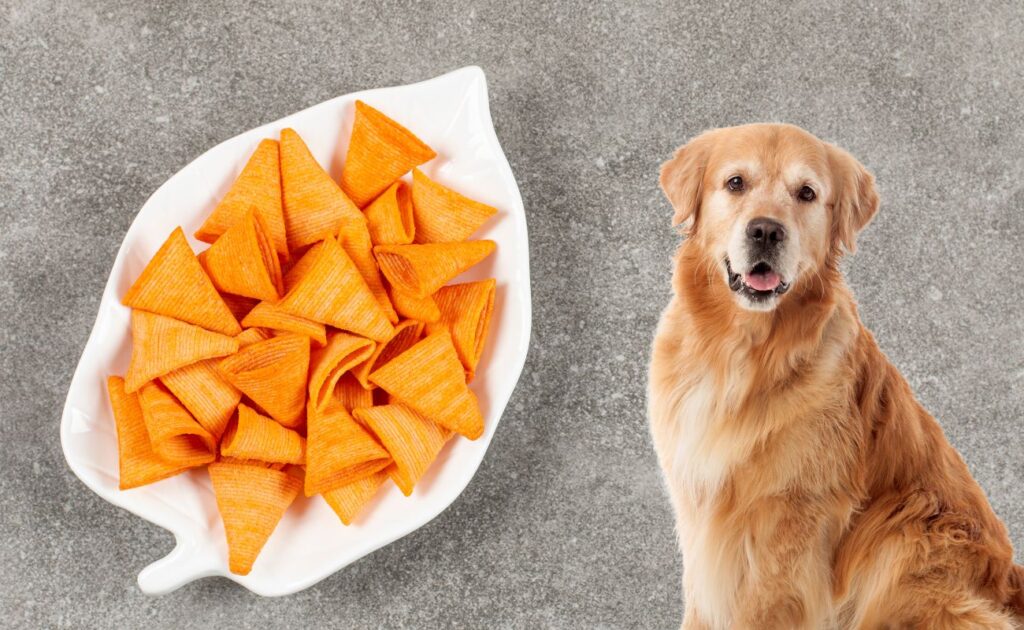Can Dogs Have Honey Nut Cheerios?

As pet owners, we constantly strive to give our furry friends the best care possible, including their diet. A common question many dog owners ask is, Can dogs have Honey Nut Cheerios? Let’s explore this topic in detail to understand the implications of feeding Honey Nut Cheerios to dogs and ensure we make informed decisions for their health and well-being. Understanding Honey Nut Cheerios Can Dogs Have Honey Nut Cheerios? Honey Nut Cheerios is a popular breakfast cereal enjoyed by many people. It’s known for its sweet taste, derived from honey and sugar, combined with the crunchiness of oats. This cereal is often considered a relatively healthy option for humans due to its whole grain content and essential vitamins and minerals. However, what’s beneficial for humans isn’t always suitable for dogs. Ingredients and Nutritional Content Honey Nut Cheerios contain whole grain oats, sugar, honey, brown sugar syrup, and various vitamins and minerals like calcium carbonate, zinc, and iron. While oats are generally safe for dogs, the added sugars and honey can pose health risks if consumed in large quantities. Dogs don’t require sugar in their diet, and excessive sugar intake can lead to obesity, dental problems, and even diabetes. Here’s a table detailing the nutritional profile of Honey Nut Cheerios per 1 cup (37 grams): Nutrient Amount per 1 Cup (37g) Calories 146 Total Fat 2.2g Saturated Fat 0.3g Trans Fat 0g Cholesterol 0mg Sodium 210mg Total Carbohydrates 30g Dietary Fiber 2.7g Sugars 12g Protein 2.6g Vitamin D 2mcg (10% DV) Calcium 130mg (10% DV) Iron 4.5mg (25% DV) Potassium 180mg (4% DV) Vitamin A 10% DV Vitamin C 10% DV Vitamin B6 25% DV Vitamin B12 25% DV Folate (Folic Acid) 50% DV Zinc 10% DV *DV = Daily Value, based on a 2,000 calorie diet. Is It Safe for Dogs to Eat Honey Nut Cheerios? When considering whether dogs can have Honey Nut Cheerios, it’s crucial to look at both the ingredients and the nutritional needs of dogs. Let’s break down the key factors to determine if this cereal is a safe treat for your dog. Potential Benefits While Honey Nut Cheerios are not inherently toxic to dogs, they don’t offer significant nutritional benefits. The whole grain oats might provide some fiber, which can aid digestion. However, this minimal benefit doesn’t outweigh the potential risks associated with the added sugars. Potential Risks The primary concern with feeding Honey Nut Cheerios to dogs is the sugar content. Excessive sugar can lead to various health issues, including: Obesity: Just like in humans, high sugar intake can cause weight gain in dogs, leading to obesity. Obesity can, in turn, result in joint problems, heart disease, and decreased life expectancy. Dental Issues: Sugar can contribute to plaque buildup and tooth decay, resulting in painful dental problems that may require veterinary intervention. Diabetes: Long-term consumption of sugary foods can increase the risk of diabetes, a serious condition that requires lifelong management. Alternative Treats for Dogs If you’re looking for healthy snack alternatives for your dog, several options are far better than Honey Nut Cheerios. Consider these nutritious treats: Fruits and Vegetables Many fruits and vegetables are safe and beneficial for dogs. Some great options include: Carrots: Low in calories and high in fiber and vitamins, carrots are excellent for dental health. Apples: Rich in vitamins A and C, apples are a healthy treat. Just be sure to remove the seeds and core. Blueberries: These are packed with antioxidants and can be a tasty, low-calorie treat. Commercial Dog Treats There are numerous commercial dog treats formulated to meet the nutritional needs of dogs. Look for treats that are low in calories and free from artificial additives. Many brands offer treats made from natural ingredients, ensuring your dog gets a healthy and tasty snack. How to Feed Honey Nut Cheerios to Dogs Safely If you still wish to feed Honey Nut Cheerios to your dog, it should be done in moderation and as an occasional treat rather than a regular part of their diet. Here are some guidelines to follow: Small Quantities Only give your dog a small amount of Honey Nut Cheerios. A few pieces as a rare treat won’t harm most dogs, but it’s essential to monitor their reaction and ensure they don’t develop a preference for sugary foods. Monitor for Allergic Reactions Although rare, some dogs might have allergic reactions to certain ingredients in Honey Nut Cheerios. Keep an eye out for signs of allergies such as itching, swelling, or gastrointestinal issues. If any adverse reactions occur, discontinue feeding immediately and consult your veterinarian. SUMMARY Can Dogs Have Honey Nut Cheerios? So, can dogs have Honey Nut Cheerios? While they aren’t toxic and can be given in small amounts as an occasional treat, they aren’t the healthiest option for your dog. The high sugar content poses significant health risks, and there are far better alternatives available. For your dog’s well-being, it’s best to opt for healthier treats that align with their nutritional needs. By understanding the implications of feeding Honey Nut Cheerios to dogs and exploring healthier alternatives, you can ensure your furry friend remains happy, healthy, and thriving. Always consult with your veterinarian before introducing new foods to your dog’s diet to make the best decisions for their health.
Can Cats Eat Doritos?

Understanding Doritos, Can Cats Eat Doritos? Doritos are a popular snack produced by Frito-Lay, known for their crunchy texture and bold flavors. They come in various flavors, including nacho cheese, cool ranch, and spicy flavors, making them a favorite indulgence for many humans. Many cat owners may be tempted to share their favorite snacks, such as Doritos, with their feline companions. Doritos are a popular type of flavored tortilla chip enjoyed by humans worldwide, but can cats eat Doritos? In this comprehensive guide, we’ll explore the question and provide valuable insights into feline nutrition and safety considerations. Ingredients in Doritos The ingredients in Doritos typically include Corn Vegetable oil Seasoning blends and additives for flavor and preservation. While these ingredients may be safe for human consumption, they may not be suitable for cats. The high fat, salt, and seasoning content in Doritos can potentially cause digestive upset, sodium toxicity, or other health issues in cats. Can Cats Digest Doritos? While cats have digestive systems that can tolerate a variety of foods, Doritos may not be easily digestible for all cats. The high fat and salt content in Doritos can lead to gastrointestinal upset and may contribute to obesity and other health problems in cats. Potential Risks of Feeding Doritos to Cats Feeding Doritos to cats can pose several risks, including digestive upset, obesity, and sodium toxicity. Additionally, some ingredients in Doritos, such as artificial flavors and preservatives, may be harmful to cats in large quantities. Nutritional Value of Doritos Doritos are relatively high in calories, fat, sodium, and artificial additives, with minimal nutritional benefits for cats. While they may provide a quick energy boost for humans, they do not offer significant nutritional value for cats and should be avoided as part of their regular diet. Here’s the approximate nutritional value of Doritos per 1 ounce (about 28 grams), based on the classic nacho cheese flavor Nutrient Amount Per Serving Calories 140 Total Fat 7g Saturated Fat 1g Cholesterol 0mg Sodium 210mg Total Carbohydrates 18g Dietary Fiber 1g Sugars 0g Protein 2g Please note that the values provided are approximate and may vary slightly depending on the specific flavor and brand of Doritos. Additionally, serving sizes may differ, so it’s essential to check the nutrition label for accurate information. Safe Alternatives for Cat Treats Instead of feeding Doritos to your cat, consider offering them safe and nutritious alternatives, such as commercially available cat treats made from wholesome ingredients. Look for treats specifically formulated for feline consumption to ensure they meet your cat’s nutritional needs. Introducing New Foods into Your Cat’s Diet When introducing new foods into your cat’s diet, do so gradually and in small quantities to monitor their reaction. Watch for any signs of digestive upset or allergic reactions, and consult with your veterinarian if you have concerns. Signs of Digestive Upset in Cats Common signs of digestive upset in cats include Vomiting Diarrhea Abdominal pain Lethargy Decreased appetite and changes in litter box habits. If your cat experiences any of these symptoms after consuming Doritos, discontinue the food and contact your veterinarian for guidance. What to Do If Your Cat Eats Doritos If your cat consumes Doritos accidentally, monitor them closely for any signs of illness or discomfort. Offer plenty of fresh water to help dilute any potential toxins and contact your veterinarian for further advice. Summary Can Cats Eat Doritos? Prioritizing Your Cat’s Health and Well-being While Doritos may be a tasty snack for humans, they are not suitable for cats due to their high fat, salt, and seasoning content. As a responsible pet owner, it’s essential to prioritize your cat’s health and well-being by providing them with a balanced and nutritious diet tailored to their specific needs. When in doubt, consult with your veterinarian for personalized dietary recommendations and guidance. Remember, keeping your cat healthy and happy is the ultimate goal.
Can Dogs Eat Doritos?

Understanding Doritos, Can Dogs Eat Doritos? Doritos have become an iconic snack in many households, known for their crunchy texture and bold flavors. Originally introduced in the 1960s, Doritos have since become a staple in snack aisles worldwide. Their popularity stems from their variety of flavors, ranging from classic nacho cheese to tangy cool ranch and spicy options. While humans enjoy the satisfying crunch and savory taste of Doritos, it’s important to consider whether they are suitable for our canine companions. Many dog owners may wonder about sharing their favorite snacks, such as Doritos, with their furry companions. Doritos are a popular type of flavored tortilla chip enjoyed by humans worldwide, but can dogs eat Doritos? In this comprehensive guide, we’ll explore the question and provide valuable insights into canine nutrition and safety considerations. Ingredients in Doritos The ingredients in Doritos typically include Corn Vegetable oil Seasoning blends and additives for flavor and preservation. While these ingredients may be safe for human consumption, they may not be suitable for dogs. The high fat, salt, and seasoning content in Doritos can potentially cause digestive upset, sodium toxicity, or other health issues in dogs. Additionally, some ingredients, such as artificial flavors and preservatives, may not be well-tolerated by dogs’ sensitive digestive systems. Therefore, it’s essential to carefully examine the ingredient list and consider the potential risks before sharing Doritos with your furry friend. Can Dogs Digest Doritos? While dogs have digestive systems that can tolerate a variety of foods, Doritos may not be easily digestible for all dogs. The high fat, salt, and seasoning content in Doritos can lead to gastrointestinal upset and may contribute to obesity and other health problems in dogs. Potential Risks of Feeding Doritos to Dogs Feeding Doritos to dogs can pose several risks, including digestive upset, obesity, and sodium toxicity. Additionally, some ingredients in Doritos, such as artificial flavors and preservatives, may be harmful to dogs in large quantities. Nutritional Value of Doritos Doritos are relatively high in calories, fat, sodium, and artificial additives, with minimal nutritional benefits for dogs. While they may provide a quick energy boost for humans, they do not offer significant nutritional value for dogs and should be avoided as part of their regular diet. Here’s the approximate nutritional value of Doritos per 1 ounce (about 28 grams), based on the classic nacho cheese flavor Nutrient Amount Per Serving Calories 140 Total Fat 7g Saturated Fat 1g Cholesterol 0mg Sodium 210mg Total Carbohydrates 18g Dietary Fiber 1g Sugars 0g Protein 2g Please note that the values provided are approximate and may vary slightly depending on the specific flavor and brand of Doritos. Additionally, serving sizes may differ, so it’s essential to check the nutrition label for accurate information. Safe Alternatives for Dog Treats Instead of feeding Doritos to your dog, consider offering them safe and nutritious alternatives, such as commercially available dog treats made from wholesome ingredients. Look for treats specifically formulated for canine consumption to ensure they meet your dog’s nutritional needs. Introducing New Foods into Your Dog’s Diet When introducing new foods into your dog’s diet, do so gradually and in small quantities to monitor their reaction. Watch for any signs of digestive upset or allergic reactions, and consult with your veterinarian if you have concerns. Signs of Digestive Upset in Dogs Common signs of digestive upset in dogs include Vomiting Diarrhea Abdominal pain Lethargy Decreased appetite and changes in stool quality or frequency. If your dog experiences any of these symptoms after consuming Doritos, discontinue the food and contact your veterinarian for guidance. What to Do If Your Dog Eats Doritos If your dog consumes Doritos accidentally, monitor them closely for any signs of illness or discomfort. Offer plenty of fresh water to help dilute any potential toxins and contact your veterinarian for further advice. Summary Can Dogs Eat Doritos? Prioritizing Your Dog’s Health and Well-being While Doritos may be a tasty snack for humans, they are not suitable for dogs due to their high fat, salt, and seasoning content. As a responsible pet owner, it’s essential to prioritize your dog’s health and well-being by providing them with a balanced and nutritious diet tailored to their specific needs. When in doubt, consult with your veterinarian for personalized dietary recommendations and guidance. Remember, keeping your dog healthy and happy is the ultimate goal.
Can Cats Eat Fig Newtons?

Understanding Fig Newtons, Can Cats Eat Fig Newtons? Fig Newtons, also known simply as “Newtons,” has been a beloved snack for generations. Originally created in the late 19th century, these cookies are characterized by their soft pastry exterior and sweet fig filling. They are a staple in many households and are often enjoyed as a convenient and satisfying treat. While humans may find Fig Newtons delightful, it’s essential to consider whether they are suitable for our feline companions. Many cat owners are curious about sharing their favorite snacks with their feline companions, including Fig Newtons. These soft cookies filled with fig paste are a popular treat among humans, but can cats eat Fig Newtons? In this comprehensive guide, we’ll delve into the question and provide valuable insights into feline nutrition and safety considerations. Ingredients in Fig Newtons Common ingredients in Fig Newtons include enriched Wheat flour Corn syrup Fig paste Sugar and various additives for flavor and preservation. While figs themselves can be safe for cats in moderation, Fig Newtons often contain additional ingredients that may not be suitable for feline consumption. Can Cats Digest Fig Newtons? While cats have digestive systems that can tolerate a variety of foods, Fig Newtons may not be easily digestible for all cats. The high sugar and carbohydrate content in Fig Newtons can lead to gastrointestinal upset and may contribute to weight gain and other health issues in cats. Potential Risks of Feeding Fig Newtons to Cats Feeding Fig Newtons to cats can pose several risks, including Digestive upset Obesity Dental problems Additionally, some ingredients in Fig Newtons, such as added sugars and artificial preservatives, may be harmful to cats in large quantities. Nutritional Value of Fig Newtons Fig Newtons are relatively high in calories, sugar, and carbohydrates, with minimal protein and fiber content. While they may provide a quick energy boost for humans, they do not offer significant nutritional benefits for cats. here’s the approximate nutritional value of Fig Newtons per serving (2 cookies, about 56 grams) Nutrient Amount Per Serving Calories 200 Total Fat 5g Saturated Fat 1g Cholesterol 0mg Sodium 140mg Total Carbohydrates 37g Dietary Fiber 2g Sugars 18g Protein 1g Please note that the values provided are approximate and may vary slightly depending on the specific brand and recipe of Fig Newtons. Additionally, serving sizes may differ, so it’s essential to check the nutrition label for accurate information. Safe Alternatives for Cat Treats Instead of feeding Fig Newtons to your cat, consider offering them safe and nutritious alternatives, such as commercially available cat treats made from wholesome ingredients. Look for treats specifically formulated for feline consumption to ensure they meet your cat’s nutritional needs. Introducing New Foods into Your Cat’s Diet When introducing new foods into your cat’s diet, do so gradually and in small quantities to monitor their reaction. Watch for any signs of digestive upset or allergic reactions, and consult with your veterinarian if you have concerns. Signs of Digestive Upset in Cats Common signs of digestive upset in cats include Vomiting Diarrhea Abdominal pain Lethargy Decreased appetite and changes in litter box habits. If your cat experiences any of these symptoms after consuming Fig Newtons, discontinue the food and contact your veterinarian for guidance. What to Do If Your Cat Eats Fig Newtons If your cat consumes Fig Newtons accidentally, monitor them closely for any signs of illness or discomfort. Offer plenty of fresh water to help dilute any potential toxins and contact your veterinarian for further advice. Summary Can Cats Eat Fig Newtons? Prioritizing Your Cat’s Health and Well-being While Fig Newtons may be a tasty treat for humans, they are not suitable for cats due to their high sugar and carbohydrate content. As a responsible pet owner, it’s essential to prioritize your cat’s health and well-being by providing them with a balanced and nutritious diet tailored to their specific needs. When in doubt, consult with your veterinarian for personalized dietary recommendations and guidance. Remember, keeping your cat healthy and happy is the ultimate goal.
Can Dogs Eat Fig Newtons?

Understanding Fig Newtons, Can Dogs Eat Fig Newtons? Fig Newtons, also known simply as “Newtons,” has been a beloved snack for generations. Originally created in the late 19th century, these cookies are characterized by their soft pastry exterior and sweet fig filling. They are a staple in many households and are often enjoyed as a convenient and satisfying treat. As a dog owner, you may have found yourself wondering about sharing certain human snacks with your furry friend, such as Fig Newtons. Fig Newtons are a popular cookie filled with fig paste, but can dogs eat Fig Newtons? In this comprehensive guide, we’ll explore the question and provide valuable insights into canine nutrition and safety considerations. Ingredients in Fig Newtons Fig Newtons typically contain a few key ingredients, including enriched Wheat flour Corn syrup Fig paste Sugar and various additives for flavor and preservation. The fig paste, made from dried figs, gives Fig Newtons their distinctive fruity flavor. While figs themselves can be a nutritious addition to a dog’s diet, Fig Newtons often contain additional ingredients, such as added sugars and artificial preservatives, that may not be suitable for canine consumption. Can Dogs Digest Fig Newtons? While dogs have digestive systems that can tolerate a variety of foods, Fig Newtons may not be easily digested by all dogs. The high sugar and carbohydrate content in Fig Newtons can lead to gastrointestinal upset and may contribute to obesity and dental issues in dogs. Potential Risks of Feeding Fig Newtons to Dogs Feeding Fig Newtons to dogs can pose several risks, including Digestive upset Weight gain Dental problems Additionally, some ingredients in Fig Newtons, such as added sugars and artificial preservatives, may be harmful to dogs in large quantities. Nutritional Value of Fig Newtons Fig Newtons are relatively high in calories, sugar, and carbohydrates, with minimal protein and fiber content. While they may provide a quick energy boost for humans, they do not offer significant nutritional benefits for dogs. here’s the approximate nutritional value of Fig Newtons per serving (2 cookies, about 56 grams) Nutrient Amount Per Serving Calories 200 Total Fat 5g Saturated Fat 1g Cholesterol 0mg Sodium 140mg Total Carbohydrates 37g Dietary Fiber 2g Sugars 18g Protein 1g Please note that the values provided are approximate and may vary slightly depending on the specific brand and recipe of Fig Newtons. Additionally, serving sizes may differ, so it’s essential to check the nutrition label for accurate information. Safe Alternatives for Dog Treats Instead of feeding Fig Newtons to your dog, consider offering them safe and nutritious alternatives, such as commercially available dog treats made from wholesome ingredients. Look for treats specifically formulated for canine consumption to ensure they meet your dog’s nutritional needs. Introducing New Foods into Your Dog’s Diet When introducing new foods into your dog’s diet, do so gradually and in small quantities to monitor their reaction. Watch for any signs of digestive upset or allergic reactions, and consult with your veterinarian if you have concerns. Signs of Digestive Upset in Dogs Common signs of digestive upset in dogs include Vomiting Diarrhea Abdominal pain Lethargy Decreased appetite and changes in stool quality or frequency. If your dog experiences any of these symptoms after consuming Fig Newtons, discontinue the food and contact your veterinarian for guidance. What to Do If Your Dog Eats Fig Newtons If your dog consumes Fig Newtons accidentally, monitor them closely for any signs of illness or discomfort. Offer plenty of fresh water to help dilute any potential toxins and contact your veterinarian for further advice. Summary Can Dogs Eat Fig Newtons? Prioritizing Your Dog’s Health and Well-being While Fig Newtons may be a tasty treat for humans, they are not suitable for dogs due to their high sugar and carbohydrate content. As a responsible pet owner, it’s essential to prioritize your dog’s health and well-being by providing them with a balanced and nutritious diet tailored to their specific needs. When in doubt, consult with your veterinarian for personalized dietary recommendations and guidance. Remember, keeping your dog healthy and happy is the ultimate goal.

